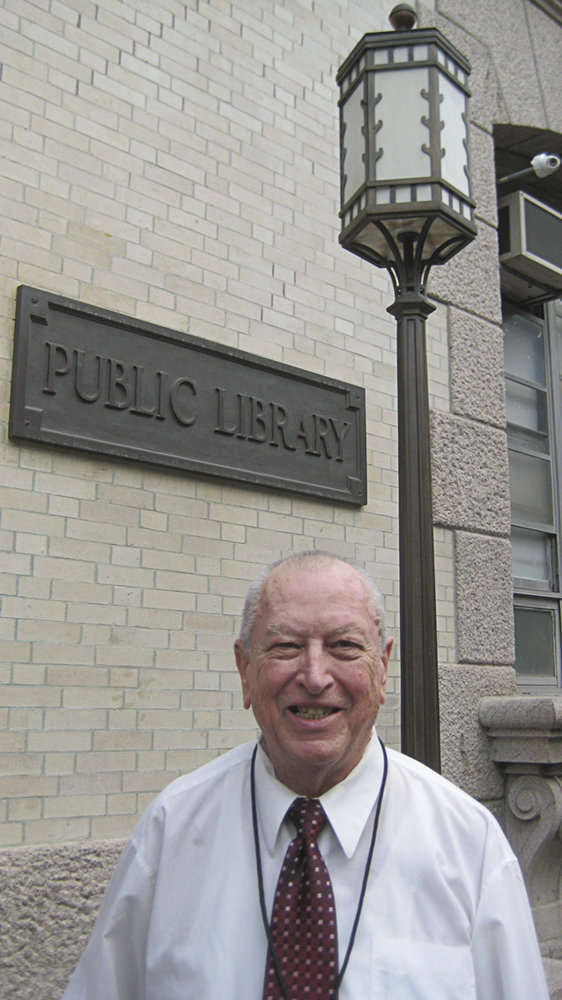In 1955, the year 16-year-old Dennis Hayes went to work part-time for the Jersey City Free Public Library, his hourly wage of 50 cents was enough for the youngster to give his mother 10 bucks for household expenses and still have enough left over for 12-cent movies at the Palace Theater on Newark Avenue.
Some weeks, Hayes even saved enough money to splurge on a 16-cent movie ticket at the Capitol Theater, known, he said, as “the high class theater.”
“I thought I was rich. I got paid every two weeks. And if I got $15, boy, I was in my glory,” said Hayes, who worked two or three hours each day after school. “It was wonderful to get that money. Kids today, they gotta pay [12] bucks to go to a movie. And we had a hard time getting the 12 cents together.”
“I’ve worked at almost every branch in the system. That’s how I was trained.” – Dennis Hayes
____________
Up from the bottom
After high school, Hayes, a Jersey City native, enrolled at St. Peter’s College where he majored in history. He continued to work part-time for the library system. He eventually earned a 25 cent raise, which brought his hourly wage up to 75 cents. The income helped pay his tuition.
“Every month we’d go to the treasurer’s office to pay the tuition,” Hayes said. “We didn’t have to pay thousands of dollars each semester. I was lucky to get a good education with not much tuition.”
Upon his graduation from Saint Peter’s College, Hayes scored a full-time position with the library system.
A true example of an employee who worked his way up from the bottom, Hayes said he started his career as a page and eventually worked his way up to become library director. Several years ago, when he decided to slow down a little, Hayes stepped down as library director and took the position of assistant library director, from which he retired on Sept. 30.
“I’ve worked at almost every branch in the system, which was a good thing, because that’s how I was trained. I learned a lot,” Hayes said. “I worked in the reference department, the lending room in the New Jersey Room, and even in the law library.”
Hayes said that in those days, most library staffers did not attend college and new hires received on-the-job training from coworkers.
“Most of the women who worked here had been at the library for 40 or 45 years. That’s how you learned, through them. Today, of course, you have to have a degree to get hired at the library.”
Everything must change
Over the years, Hayes has witnessed vast changes in the library system, particularly in the areas of automation, modernization, and staffing.
“When I first came, the library had a lot more people working here,” Hayes said. “There were about 20 people in the catalog department. Today, there are only three. That’s because today they have the computers.” The machines could print up multiple catalog cards at once.
The introduction of computers didn’t only impact the daily work of the library staff. Hayes said it also changed the staff’s interaction with patrons.
“A lot of people come in the library today and they can get all their needs answered from the computer,” Hayes observed. “They go to different databases. Now the staff member’s job is more about directing people to the right database…People don’t use reference books as much as they used to.”
‘You have to go with the flow’
Despite the changes within the library system, Hayes is neither nostalgic for the past, nor pessimistic about the future of libraries.
For the past year residents throughout the city have protested planned funding cuts to the library’s budget and staff furloughs that have led to reduced hours at library branches.
Under the city’s proposed 2011 municipal budget, the library system was originally expected to receive $300,000 less than it did last year. Much of this funding was eventually restored due to pressure from the public and the Jersey City Council. Some residents fear that this will become an annual battle.
But Hayes said that such cuts, as sad as they may seem, are inevitable in bad economic times.
“You have to go with the flow,” he said. “It’s a new way of life. It’s a new way of doing things. This goes on in different industries, and you have to adjust to that.”
Hayes said many of his coworkers have taken on part-time jobs to make up for wages lost to the mandatory furlough days instituted in various departments by City Hall. Still, he said, “morale at the library is high. People here still believe there will always be a need for the public library. I believe that, too.”
He said he couldn’t predict how libraries might be affected by the current iPad/tablet computer trend, although he was heartened to hear that several popular tablets allow readers to lend and borrow books from virtual libraries. But don’t expect Hayes to be reading “War and Peace” through an app.
“I don’t really understand them. The kids have tried to show me how they work,” Hayes admitted. “I don’t use an iPad. I still prefer to read [real] books.”
E-mail E. Assata Wright at awright@hudsonreporter.com.
